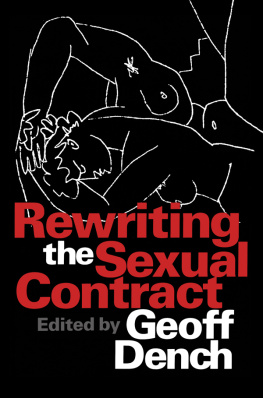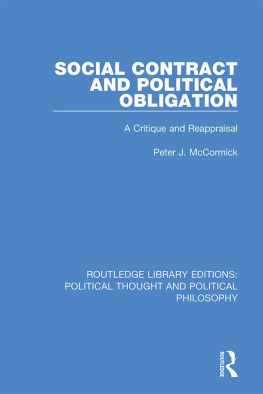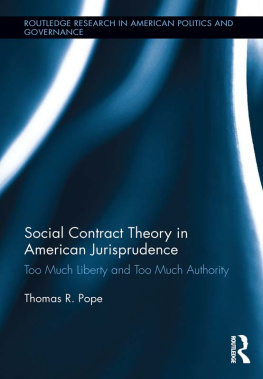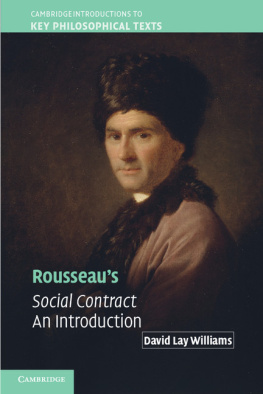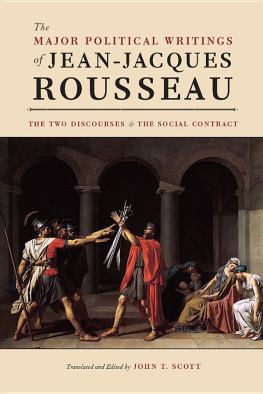The Sexual Contract
Carole Pateman
Polity Press
Copyright Carole Pateman 1988
The right of Carole Pateman to be identified as author of this work has been asserted in accordance with the Copyright, Designs and Patents Act 1988.
First published in 1988 by Polity Press in association with Blackwell Publishers Ltd. Reprinted 1989, 1991, 1994, 1995, 1997
Editorial office:
Polity Press
65 Bridge Street
Cambridge CB2 1UR, UK
Marketing and production:
Blackwell Publishers Ltd
108 Cowley Road
Oxford OX4 1JF, UK
All rights reserved. Except for the quotation of short passages for the purposes of criticism and review, no part of this publication may be reproduced, stored in a retrieval system, or transmitted, in any form or by any means, electronic, mechanical, photocopying, recording or otherwise, without the prior permission of the publisher.
Except in the United States of America, this book is sold subject to the condition that it shall not, by way of trade or otherwise, be lent, re-sold, hired out, or otherwise circulated without the publishers prior consent in any form of binding or cover other than that in which it is published and without a similar condition including this condition being imposed on the subsequent purchaser.
ISBN 0745604315
ISBN 0745604323 (pbk)
A CIP catalogue record for this book is available from the British Library.
Typeset in 11 on 121/2 Baskerville by Downdell Ltd., Abingdon, Oxon.
Printed in Great Britain by Hartnolls Ltd., Bodmin, Cornwall.
In memory of my father
Ronald Bennett
A ring of gold with the sun in it?
Lies, lies and a grief
Sylvia Plath The Couriers
... the man remains
Sceptreless, free, uncircumscribed, but man
Equal,. unclassed, tribeless, and nationless,
Exempt from awe, worship, degree, the king
Over himself;
Percy Bysshe Shelley Prometheus Unbound
Contents
Preface
There has been a major revival of interest in contract theory since the early 1970s that shows no immediate signs of abating. New, sophisticated formulations of the idea of a social contract are accompanied by some highly technical and, in many cases, very elegant developments of contract argument, some of which are presented by Marxists, once firm opponents of the theoretical assumptions and practical implications of contract doctrine. My reason for adding a very different contribution to the literature is that something vital is missing from the current discussion. The sexual contract is never mentioned. The sexual contract is a repressed dimension of contract theory, an integral part of the rational choice of the familiar, original agreement. The original contract as typically understood today is only part of the act of political genesis depicted in the pages of the classic contract theorists of the seventeenth and eighteenth centuries. The aim of my study is to begin to break through the layers of theoretical self-censorship.
In one sense, this is an auspicious moment to write about the sexual contract. The extraordinarily widespread influence of contract doctrine means that the full ramifications of contract can now be glimpsed. In another sense, the moment is inauspicious; the very influence of contract theory threatens to bury the sexual contract more deeply than before and further to marginalize feminist argument critical of contract. That contract theory now has a new lease of life is not merely a consequence of the internal evolution of political theory but bound up with wider political developments centred on an interpretation of democracy as individual initiative (or choice), which can be summed up succinctly in the slogans of private enterprise and privatization. The whole political package is marketed under the name of freedom. Sales (at least until late 1987) have been spectacularly successful, with buyers coming from regions once resistant to such political advertisements. The old socialist arguments against contract have lost much of their cogency in the present political context and, if new forms of criticism are to be developed, a new look at contract theory is required. Contract theory is concerned with more than fictions of original agreements; contract theorists claim to show how major political institutions should properly be understood. Citizenship, employment and marriage are all contractual, but since they are seen through the lens of a drastically truncated contract theory indeed, a theory that has literally been emasculated the social contract and the employment contract are systematically misrepresented and the marriage contract is usually ignored.
I became aware that the social contract presupposed the sexual contract, and that civil freedom presupposed patriarchal right, only after several years work on classical contract theory and associated theoretical and practical problems of consent. I was interested initially in political obligation and although my conclusions on that subject (published in The Problem of Political Obligation) diverged from many accounts, my argument largely remained within conventional boundaries. My discussion began to push against the confines of social contract theory by noting that the classic theorists had left a legacy of problems about womens incorporation into, and obligation within, civil society that contemporary arguments failed to acknowledge. I began to appreciate the depth and character of the failure only when I asked specifically feminist questions about the texts and about actual examples of contractual relations, instead of trying to deal with the problem of womens incorporation from within mainstream political theory. Conventional approaches cannot show why the problem is so persistent and intractable, or why the critics as well as the advocates of contract cannot take feminism seriously without undermining their construction of the political and political relations.
Some of my arguments have been prompted by writers customarily labelled radical feminists, but the classification of feminists into radicals, liberals and socialists suggests that feminism is always secondary, a supplement to other doctrines. Feminism, like socialism, is implicated to some degree in contract and, despite controversy for more than a decade among feminists about the concept of patriarchy, remarkably little attention has been paid to the contractual character of modern patriarchy. Nonetheless, my deepest intellectual debt is to the arguments and activities of the feminist movement, which has transformed my view both of political theory and of political life.
This book has been some years in the making and has benefited from many conversations, often on apparently unrelated topics, and discussions of papers and lectures in Australia and the United States, and I am grateful to all the participants. The writing was less protracted. I decided to attempt to draw together one strand of my work, and I wrote drafts of some of the material, while I was a Fellow at the Center for Advanced Study in the Behavioral Sciences at Stanford in 19845. I was fortunate to have such exceptionally congenial intellectual and physical surroundings and the assistance of the friendly, efficient staff while I was trying to get my thoughts in order. I was just as fortunate during 19867 when I was a Member of the School of Social Science at the Institute for Advanced Study at Princeton. At the Institute, I was in a very different but exceptionally tranquil yet stimulating intellectual environment. The whole of the present text was written in the private affluence of the Institute for Advanced Study, except for the final chapter, which was completed amid the public stringency of the University of Sydney.
I am especially grateful to Joan Scott for reading and commenting on chapters 1 to 4, to Itsie Hull for detailed comments on and this Preface to the computer and, once again, has given support to my academic work and has been an acute critic. I should also like to thank David Held for his encouragement and exemplary editorial efficiency.
Next page

